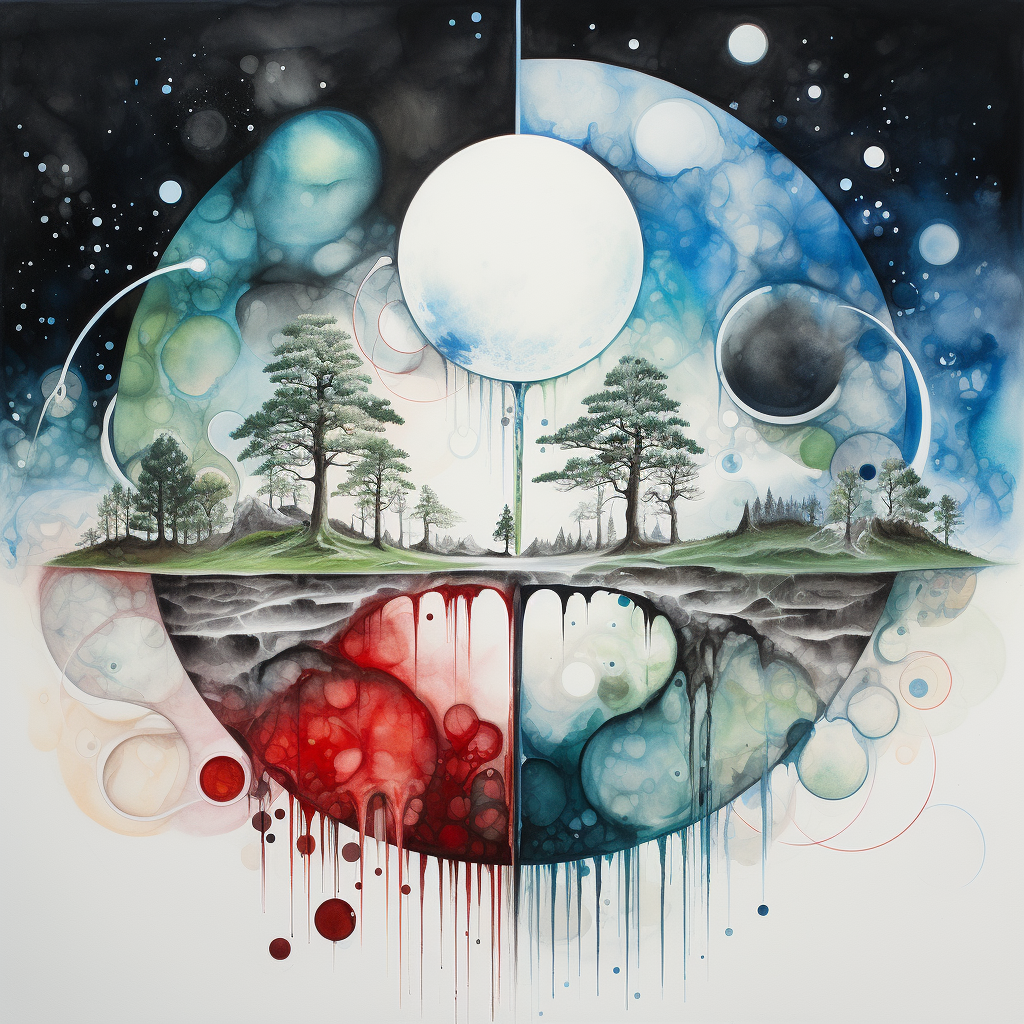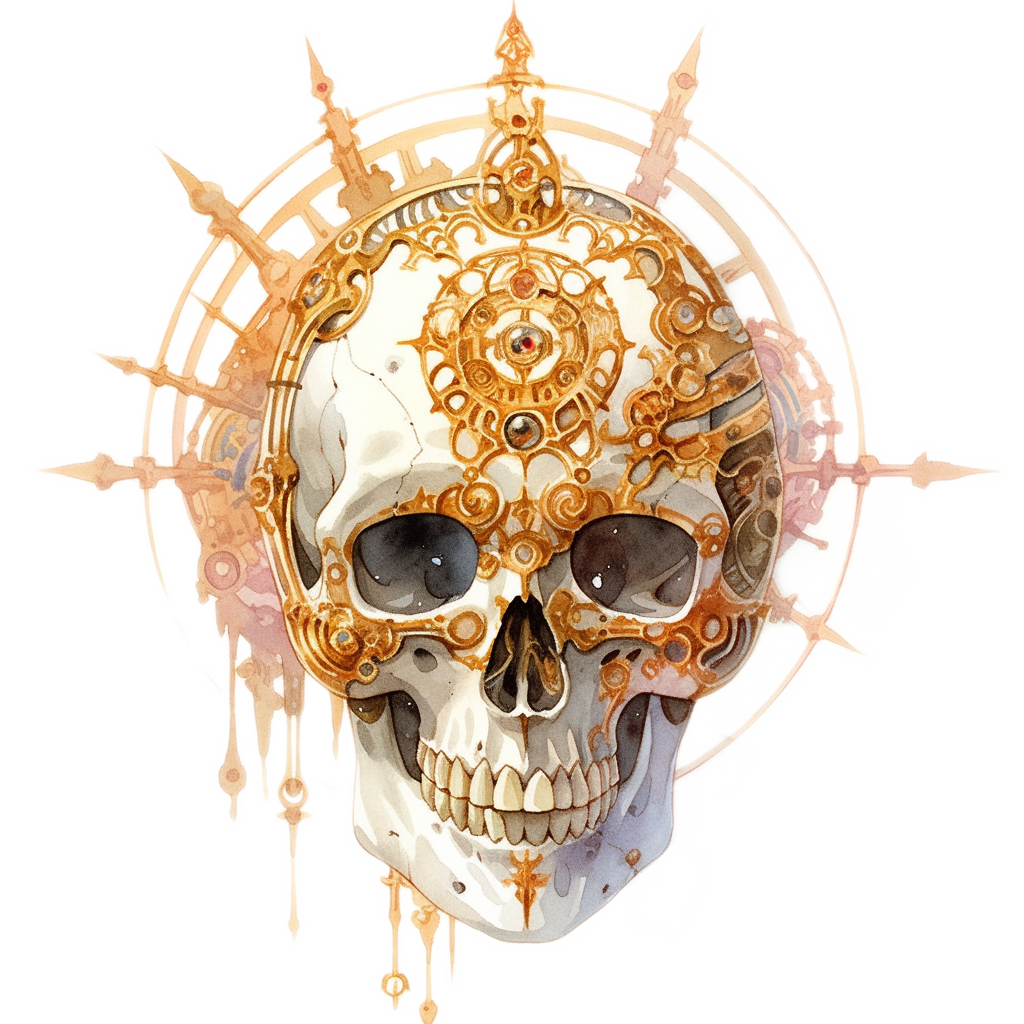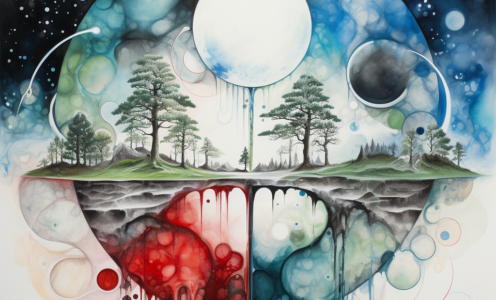Chapter One: White
The oldest among us recall the time before our departure, and though they claim this prior age to be an unrivaled eternity they can scarcely recall any details of its passage. No material space yet existed in this age, nor had any cohesive ideologies begun to form amidst the plane of thought. Though life as we now know it did not and would not exist for ages to come, all of the ingredients necessary for its emergence lie scattered across existence. Thus, from the potential for feeling and understanding—the possibility that beings might one day exist to express Valor, Wonder, Anger, Vigor, and Grief—the first of our kind coalesced within the Aether.
With no realms yet to call our own, these Incarnations traversed this primordial expanse in search of companionship, finding others like ourselves in the disparate reaches. In vague expressions that became an approximation of language, they shared their passions and ideals, the joys and tumults that came from simply existing. Through these conversations, their understanding of all that could be evolved, their perspectives growing more nuanced and elaborate with each being who added their voice to the great exchange and each connection formed between multiple philosophies. Each of the Incarnations sought further understanding from their fellows, eager to form a fuller picture of what reality could one day be.
Amidst the exchanges, certain pieces of consensus and contention emerged which fragmented the discussion: fundamental disagreement on the grand course of existence and what would eventually become of the countless experiences these interlocutors had imagined. Our cosmic discussion became split between five factions, and though these Incarnations continued to debate their positions they each became inextricably tied to one or more of these “Pentiles.”
One Pentile told of the great discoveries that brought fulfillment and prosperity, and how the pursuit of knowledge and truth enabled and thus eclipsed all other goals.
Another countered by saying that knowledge was a simple tool for stability, and how beings who fear no upheaval can be content in having learned enough.
A third challenged this by asserting that stability could be viewed as a vector for contentment, and that joy in any form is where a culture should direct itself.
The fourth challenged the idea that a culture could direct itself, and spoke of how the complex web of many beings, cultures, and natural forces would eventually drive existence towards a single cohesive harmony.
The last rejected the very idea of some stable finality, presenting their experiences of how even the most enlightened cultures would ultimately sow the seeds of their own demise.
There were some Incarnations which tread among multiple Pentiles, even some who sought to shape a singular thesis which would merge these contradictory conclusions. As their deliberations prattled on, the cosmos on which the Incarnations pontificated transitioned from theory into being, with worlds and planes and all the spaces between emerging with little regard from the Pentiles themselves. Only when the primordial conflicts of this new existence came for the Incarnations did they take notice of the space beyond their musings.
The first factions of the cosmos had little patience for speculation and possibility, for upon meeting the Pentiles these forces had already amassed themselves into two embittered enemies. On one side of existence stood the forces of Law, a coalition of element and belief seeking to encode existence with path and purpose. Opposite them were the embodiments of Chaos, seeking to shatter all cosmic pretenses and establish a wholly malleable reality. None of the Pentiles aligned cleanly with either ethical paradigm, and all feared that their neutrality and in turn their principles would be eroded as the War of Law and Chaos persisted. The Incarnations sought not to shape the multiverse but to understand it, and the Great Wheel seemed to spare no ground for such passivity.
Wishing to save themselves and the exchange which they had built, the Pentiles chose to flee the coagulating circles of the Outer, Inner, and Material Planes. They retreated together into the receding Aether which had nurtured them, a cosmic sea which had by then become known as the Ethereal Plane. Deep within the waveless roil, many among the Incarnations wished to continue their conversation as if nothing had changed, but too many saw how reality had transcended even their vast imaginations. Theory alone would not divulge an answer, and only by observing the experiences and convictions of actual beings could the Pentiles achieve any sort of thesis. Thus, if they were no longer welcome in the multiverse, the Incarnations would harness their vast power and numbers to recreate it.
From the Deep Ethereal, the Pentiles reached into the dreaming minds of countless beings, sculpting landscapes and peoples from the archetypes of innumerable cultures. In time, these creations would form ecosystems and communities, growing to understand the same passions which the Incarnations embodied. The Pentiles were each eager to demonstrate the validity of their thesis, however, and so each laid claim to portions of the environment by infusing it with their peculiar variety of power. Each Pentile was made up of countless beings, and together the forces which composed them could fuel entire worlds. The invocation of a specific Pentile’s energy, which now coursed through paths known as leylines in a phenomenon known as mana, would serve as evidence to a specific thesis.
The first Pentile laid claim to the vast plains of each fabricated world, bountiful soil which could nourish communities and serve as stable foundation. Through its mana, it brought gifts of health, protection, unity, and structure. Finally, this Pentile created the first angels to serve as guides for the beings across existence. In time, this Pentile would become associated with the color White.
The second Pentile invested its gifts in remote islands and swirling waves, realms of mystery and possibility which invited inhabitants to seek out new frontiers and study all that surrounds them. Its mana gave the tools to better observe and reshape their surroundings, rewarding cognizance and adaptation with clever countermeasures and evasion. The clever sphinxes would serve as the emissaries of this Pentile, their fascination with riddles and patterns encouraging the scrutiny of mortals. This faction would be heralded by the color Blue.
The third Pentile displayed cynicism through its attachment to swamps, entrapping and untraversable mires where nothing could truly last. Its mana could be invoked for powers of transience and despair, bringing ruin upon the world or drawing power from memory and self-destruction. The demons which would become the face of this Pentile cared little for mortal guidance, amassing power for themselves and leaving others to learn from their examples. These forces and their methods would be denoted by the color Black.
The fourth Pentile believed that beings would be defined by exuberance and passion, and so bound its power to the great mountains. These grand peaks inspired and challenged all witnesses, nurturing the impulsiveness of their denizens. The explosive force of the Pentile’s mana could be invoked in fire, lightning, speed, and at times unbridled chaos. Though dragons would eventually cover the entire spectrum of beliefs, their immense power and imposing stature betray their origins in what is now called the color Red.
The final Pentile had little faith in the notion that cultures or worlds could be shaped, and so focused its power in the wild and intractable forests. Its mana amplified natural processes of growth and decay, rewarding those who lived simply and patiently. As the ultimate sacrifice of conscious control, this Pentile formed the bestial hydras as its representatives: beings with no greater goals than to survive and grow. This final Pentile would come to be represented by the color Green.
Within their realm in the Aether, the five Pentiles wove their mana through the leylines of their creating worlds, priming their great observation to begin. The powers of mana would become ingrained in these emergent realms, forming a force which most would translate as Magic. The five Pentiles of Incarnations, as makers of this vast expanse, would bear the title of The Gathering.
Source: Matt Daley


